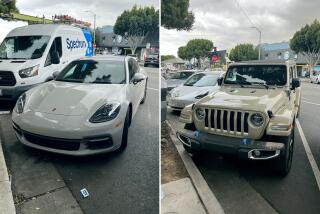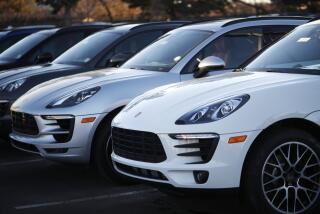Porsche’s Fast Cars, Fat Profit
- Share via
FRANKFURT, Germany — Forget for a moment that Porsche has made some of world’s most sought-after cars, from the roaring 911 Turbo to the exotic all-wheel-drive 959 that was never sold in America. It also is a company with stockholders, a share price and a profit margin--the best in the business, in fact.
The German auto maker is an unconventional company, run by an unconventional executive. At a time manufacturers around the world are facing pricing, production and profit crises, Porsche is sitting on record sales and earnings as it goes through the biggest expansion in its history.
Stuttgart-based Porsche has just introduced two new versions of its flagship 911 for 2002: the fleet 456-horsepower GT2 and the Targa, with more window glass and a new profile and roof line. The auto maker is preparing to unveil its first sport-utility vehicle after midyear, and it is likely to green-light the Carrera GT, a fantasy supercar that is expected to carry a $350,000 price tag.
All this comes under the unorthodox management of Chief Executive Wendelin Wiedeking. He took over the company in 1993 when it was teetering on the edge of bankruptcy--selling fewer than 13,000 cars globally, down from a peak of 53,600 in 1985--and its share price was the equivalent of a flaccid 16 euros, or about $14.
In the last fiscal year, which ended July 31, Porsche set a sales record of 54,600 cars and scored an enviable pretax profit margin of 13%, reaffirming the tiny manufacturer of performance sports cars as the world’s most profitable auto maker.
The stock, which plunged 50% after the September terrorist attacks, skyrocketed back to a 52-week high this month near $390 and is now trading at about 90% of that. Porsche said last month that net income in the last fiscal year rose 29% to about $240 million, as sales rose 22% to $3.9 billion.
Compared with Porsche, General Motors Corp., the healthiest of the domestic U.S. auto makers, looks anemic. GM’s pretax profit margin is a meager 3.7%; no other auto maker besides Porsche breaks 10% on its margins. GM’s languishing stock price is somewhat better, at $48 some 69% of its 52-week high.
Today, Wiedeking is one of the most-admired auto chieftains, up there with Nissan Motor Co.’s Carlos Ghosn, likewise lauded for pulling his company back from the brink of failure.
Wiedeking, 49, has pulled some unthinkable moves, such as bringing in Japanese consultants to advise on “lean” manufacturing, and having a company in Finland assemble many of Porsche’s sleek Boxster roadsters.
But he can be as stubborn as a mule. Faced with being kicked off a key stock index by Deutsche Boerse, operator of the Frankfurt stock exchange, for refusing to issue quarterly reports, Wiedeking would not give way, and Porsche was booted this year.
“Porsche is reporting each month, each week, a lot of financial-driven information about the situation of the company,” Wiedeking said in an interview this fall at the Frankfurt International Motor Show. “We are informing our shareholders in every aspect: what we want to reach, what are our sales goals--short-term, mid-term and long-term. And we always deliver.”
He wants long-term investors, not those who play the market for quick profit.
“I don’t want to have an investor who’s happy or unhappy with the company because an analyst says, ‘OK, I estimate they should be better, they haven’t met my target, so sell it,’” Wiedeking said. “Then tomorrow they announce that they are now better. ‘OK, buy it back.’”
Many analysts don’t seem to mind the information flow.
“Porsche is enjoying an incredibly positive equity story at the moment, which allows them to handle things in a different way,” said Erik Burgold, auto analyst with ING Barings in Frankfurt, who believes Porsche generally provides good financial information. “They have a very attractive model lineup, and people are willing to pay premiums, which allows Porsche attractive margins.”
The company “is a money machine, no question about it,” said Louis Bailoni, an industry analyst with ABN Amro in London. “It’s become the benchmark of lean production and modular outsourcing.”
Analysts’ beef is with Porsche’s dividends, which Burgold calls “a rather sad story.”
“All the value is in capital appreciation,” Bailoni said. “If you had invested in the stock five years ago, you’d have a very, very nice return.”
Wiedeking defends the stingy dividends, acknowledging: “We keep the most money in our hands. But it doesn’t mean that we want it [for ourselves]. We want to reinvest it in the product.”
That product has had a mixed past. The first Porsches of the late 1940s, like most sports cars of that era, were hardly high-performance, putting out 40 horsepower. But success in racing made the marque. The entry-level 914, introduced in 1970, was maligned by purists as a tarted-up Volkswagen. Likewise, the Audi-manufactured 924 of the late ‘70s was as poorly received as the 914.
The 234-horsepower 911 Turbo arrived in 1975, but it was only in 1985 that Porsche built its first true supercar for street use, the limited-production 959 with its 2.85-liter twin-turbo engine pounding out 400 horses.
Porsche’s sales began to go off a cliff in the late 1980s because of soaring costs and the weakening dollar, which made the cars more expensive in the United States. North American sales slid from a record 30,471 vehicles in 1986 to a mere 3,713 in 1993, when Wiedeking became chairman.
The Boxster’s arrival in 1997 heralded Porsche’s renaissance; it was seen as such a beautiful car that it has undergone virtually no external changes in five years. Even though Boxster sales dropped 8.1% through November, year-over-year, sales of the 911 variants remain strong and are expected to carry Porsche to another profitable fiscal year, ending in July, around the time the all-new Porsche Cayenne SUV is to make its debut.
The most remarkable aspect of the Cayenne--after the fact that Porsche is doing an SUV at all--is that it is part of a joint project with Volkswagen. The companies have worked together before, notably on engines, and VW Chairman Ferdinand Piech is a grandson of the legendary Ferdinand Porsche Sr. and sits on Porsche’s board.
But critics of the Cayenne, who include legions of loyal Porsche owners around the U.S., say the collaboration will dilute Porsche’s exclusive image.
Wiedeking dismisses the complaints.
“The SUV market is very competitive, and we are a newcomer, a real newcomer,” he said. “We have no heritage--for VW too, for both of us. Even VW needs some impact for the cost. So we decided, ‘OK, let’s make the components together,’ defining safety issues--structure, for instance. And also components later on. If you can share the window-raising parts, for example, it means a lot.”
VW projects annual sales of about 80,000 of its SUV, tentatively called the Colorado, and Porsche envisions sales of at least 20,000 Cayennes a year, which could rocket the brand’s annual global sales to more than 80,000.
Few details are known about the Cayenne--except that Porsche reckons it will be the fastest SUV on the planet. Company insiders say it probably will be built in six-cylinder, eight-cylinder and twin-turbo versions and is expected to start at less than the $66,000 that the 911 commands.
The joint development provides an economy of scale, with a partner to share development costs that offsets the huge investment needed to develop an entirely new model. Porsche is taking the lead in engineering the vehicle to ensure that it will live up to its badge.
Most important, Wiedeking said, it will be a German SUV made in Germany, unlike the made-in-USA Mercedes M-Class (Alabama) and BMW X5 (South Carolina).
“We did a survey in the SUV market: Ninety percent of the M-Class customers didn’t know the car is produced in the U.S.,” Wiedeking said forcefully. “They think it’s produced in Germany.” Respondents said they would be willing to pay a higher price for the Cayenne if it were built in Germany, he said.
Wiedeking is expected to make it known soon that Porsche will build the Carrera GT, a beautifully styled near-racing car powered by a 5.5-liter, 558-horsepower V-10 engine rated at 205 mph.
Another decision on the horizon is to determine whether Porsche will return to racing.
“I think it’s essential. It’s the only reason people buy the cars,” said Greg Salchow, auto industry analyst for investment bank Raymond James in Detroit and owner of a 1987 911 Targa.
“The more they steer away from racing, the worse the outlook is for the company,” Salchow said. “If they’re not in racing, I’d have to question what makes them special.”
Wiedeking said that day is near. He pulled the company out of racing after a win at Le Mans a few years back to concentrate on a product offensive to turn the company around.
“There will be a time Porsche has to come back [to racing],” Wiedeking said. “We will come back after we introduce the Cayenne.”
Terril Yue Jones is The Times’ Detroit bureau chief. He can be reached at t.jones@latimes.com.





